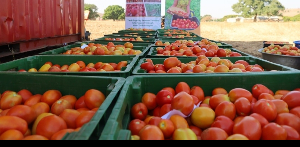Farmers in the Northern Ecological Zone have been urged to adopt early maturing crops to increase food production and sustain food supply to families.
Mr Joshua Diedong, the Upper East Regional Crops Officer, Ministry of Food and Agriculture (MOFA), made the call in an interview with the Ghana News Agency in Bolgatanga.
He said considering the changes in the rainfall pattern and extreme weather conditions such as floods and droughts, farmers needed to farm early maturing crops in order to sustain food production.
He noted that the Upper East Region had up to 80 per cent farmer population and early maturing crops would ensure better yield and increase the income and feeding of many families.
He acknowledged food price hikes in the Region and indicated that it could be linked to internal and external challenges such as the dry spell, which hit some parts of the southern regions and the floods around the White Volta that affected crop yield.
According to him some seed varieties released by the Council for Scientific and Industrial Research (CSIR) and the Savannah Agricultural Research Institute (SARI) and registered in 2019 were yet to be adopted by many farmers in the regions.
Some of such varieties include, “Honampa”, registered by CSIR in 2019, has an early maturity period of 110 days, Omankwa ,registered in 2012 and released in 2019 has a yield potential of 7.9 tonnes per hectare and RMG Obaapa Maize with a yield potential of nine tonnes per hectare.
He said Abro Legon, a 2019 release also had a yield potential of 10 tonnes per hectare with 95 maturity days and SARI maize, another early maturing crop with yield potential of 8.5 tonnes per hectare.
The maize varieties according to him were in addition to existing maize varieties such as “Wandata”, “Sansalima”, “mama ba”, “dada ba” and “Obaatampa”.
On rice, the crop officer, said ‘Legon rice’, released in 2019 was an early maturing variety in addition to the “Ena pa” variety, which had a potential yield of 9.5 tonnes per hectare.
Other early maturing varieties available for farmers include, “Jasmine” rice, Agra Rice, and “Gbewaa” rice varieties.
Responding to issues of farm trials with farmers to attest to potentials of some of the new seeds, he said some trials had been conducted on the maize varieties in the Bawku Municipality and Zebilla, in the Bawku West District with some farmers and the results were excellent for adoption and replication in other districts.
Mr Diedong, however reiterated the challenges with inadequate Agricultural Extension Assistants (AEAs) who could not cover all areas to provide the needed services to the farmers.
He urged the media and Civil Society Organizations in Agriculture to help increase sensitization to the farmers to adopt early maturing crop varieties to improve their efforts.
Regional News of Saturday, 20 March 2021
Source: GNA













